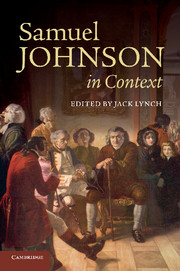Book contents
- Frontmatter
- Contents
- Illustrations
- Contributors
- Preface
- Chronology
- Abbreviations
- Part I Life and works
- Part II Critical fortunes
- Part III Contexts
- Chapter 10 America
- Chapter 11 Anglicanism
- Chapter 12 Anthropology
- Chapter 13 Authorship
- Chapter 14 Biography
- Chapter 15 Book trade
- Chapter 16 Clubs
- Chapter 17 Conversation
- Chapter 18 Dictionaries
- Chapter 19 Domestic life
- Chapter 20 Education
- Chapter 21 Empire
- Chapter 22 Essays
- Chapter 23 Fiction
- Chapter 24 History
- Chapter 25 Journalism
- Chapter 26 Law
- Chapter 27 Literary criticism
- Chapter 28 London
- Chapter 29 Medicine
- Chapter 30 Mental health
- Chapter 31 Money
- Chapter 32 Nationalism
- Chapter 33 Philosophy
- Chapter 34 Poetry
- Chapter 35 Politics
- Chapter 36 Scholarship
- Chapter 37 Science and technology
- Chapter 38 Scotland
- Chapter 39 Sermons
- Chapter 40 Shakespeare
- Chapter 41 Slavery and abolition
- Chapter 42 Social hierarchy
- Chapter 43 Theatre
- Chapter 44 Travel
- Chapter 45 Visual arts
- Chapter 46 War
- Chapter 47 Women writers
- Further reading
- Index
- References
Chapter 19 - Domestic life
from Part III - Contexts
Published online by Cambridge University Press: 05 June 2012
- Frontmatter
- Contents
- Illustrations
- Contributors
- Preface
- Chronology
- Abbreviations
- Part I Life and works
- Part II Critical fortunes
- Part III Contexts
- Chapter 10 America
- Chapter 11 Anglicanism
- Chapter 12 Anthropology
- Chapter 13 Authorship
- Chapter 14 Biography
- Chapter 15 Book trade
- Chapter 16 Clubs
- Chapter 17 Conversation
- Chapter 18 Dictionaries
- Chapter 19 Domestic life
- Chapter 20 Education
- Chapter 21 Empire
- Chapter 22 Essays
- Chapter 23 Fiction
- Chapter 24 History
- Chapter 25 Journalism
- Chapter 26 Law
- Chapter 27 Literary criticism
- Chapter 28 London
- Chapter 29 Medicine
- Chapter 30 Mental health
- Chapter 31 Money
- Chapter 32 Nationalism
- Chapter 33 Philosophy
- Chapter 34 Poetry
- Chapter 35 Politics
- Chapter 36 Scholarship
- Chapter 37 Science and technology
- Chapter 38 Scotland
- Chapter 39 Sermons
- Chapter 40 Shakespeare
- Chapter 41 Slavery and abolition
- Chapter 42 Social hierarchy
- Chapter 43 Theatre
- Chapter 44 Travel
- Chapter 45 Visual arts
- Chapter 46 War
- Chapter 47 Women writers
- Further reading
- Index
- References
Summary
FA′MILY. n.s. [familia, Latin; famille, French.]
1. Those who live in the same house; household.
The night made little impression on myself; but I cannot answer for my whole family; for my wife prevailed on me to take somewhat. Swift.
Johnson’s Dictionary defines family as “those who live in the same house,” without reference to kinship or marriage. It is telling that, in the early eighteenth century, no word existed to denote just the biological relatives within a household: servants, guests, students, patrons, governesses, tutors, apprentices, and unrelated children could fall within the category of family. Most of the terms for kinship had multiple meanings: a noun as apparently simple as father had multiple denotations that bled into each other. It could refer to the Deity, to the nation’s monarch, to a natal parent, to an adoptive or stepfather, to a father-in-law, or to a deceased male ancestor. Or it could mean a seminal individual or an august male friend. Other terms – mother, brother, sister – were similarly multivalent. To understand family life in the eighteenth century, we have to abandon many of our modern preconceptions about what a family is and try to examine the past without prejudice.
Varieties of the family
Social historians disagree on the particulars, but most concur that the early modern family was an institution in transition. In one popular account, the eighteenth century witnessed the birth of the insular married couple: throughout the era the custom of arranged, honor-based unions gave way to a more companionate model. Others suggest the transition from pragmatic to affective marriage took place in or before the late Middle Ages, and others still that such a change never took place: the nuclear family, they argue, with a married couple that was both emotionally and instrumentally bonded, was a long-standing feature of British life.
- Type
- Chapter
- Information
- Samuel Johnson in Context , pp. 166 - 173Publisher: Cambridge University PressPrint publication year: 2011



